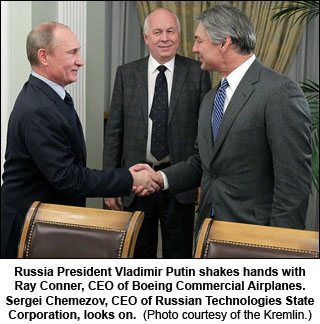OPINION
Profits come before democracy as Boeing exports jobs to Russia
(May 8, 2014) — Boeing is at it again, eating its own in Puget Sound. The company will be laying off engineers in Washington and building a new model with dispersed “centers of excellence” around the country and the world, which is corporate-speak for hiring workers at lower salaries, no union protection, and less understanding of the intricacies of building airplanes.
That makes me worried. Things can go wrong in cars, but you are still on the road. Things going wrong in airplanes when they are 30,000 feet in the air, flying at 500 miles per hour with 300 passengers on board are a much bigger problem. That’s why we need the best engineers and machinists, with the highest worker morale possible, building planes. Our lives literally depend on them.
But there is a bit more to this as well, because when Boeing lays off engineers here, it hires them in South Carolina, Alabama… and Moscow.
Moscow, the capital of Russia, the big bear that is threatening the Ukraine and other nations that won their independence with the collapse of the Soviet Union. So now when our government is imposing business sanctions against Russia, where do you think Boeing will stand? Backing up those sanctions and closing down its work in Moscow? Or counseling the administration to “go slow” and in the meantime build up its Russian workforce.
 Boeing is taking the “go slow” route. It has too much to lose withdrawing from Russia. One of Boeing’s buddies in Russia is Sergei Chemezov. He was just placed on the sanctions list as a member of Russian President Vladimir Putin’s inner circle. This guy has a “strategic partnership” with Boeing to build titanium parts. His company supplies about a third of the titanium used in Boeing’s jets. Last November Boeing committed to a joint venture in the Ural Mountains to produce titanium, reduce machining costs, and establish more than 100 new jobs … there.
Boeing is taking the “go slow” route. It has too much to lose withdrawing from Russia. One of Boeing’s buddies in Russia is Sergei Chemezov. He was just placed on the sanctions list as a member of Russian President Vladimir Putin’s inner circle. This guy has a “strategic partnership” with Boeing to build titanium parts. His company supplies about a third of the titanium used in Boeing’s jets. Last November Boeing committed to a joint venture in the Ural Mountains to produce titanium, reduce machining costs, and establish more than 100 new jobs … there.
According to its own publications, “Boeing is one of Russia’s largest partners in the areas of innovation and high technology.”
Boeing intends to invest $27 billion in Russia. The Moscow Boeing design center has participated in hundreds of projects for the 747, 737, 777, 767 and 787 family of planes. Don’t take my word for it, read this for yourself from Boeing.
The company is explicit about “work-arounds” to take away work from Puget Sound-based engineers. In late 2008, a Boeing engineering partner in Russia began 787 work to “reduce Boeing research and development expenditures.” So far the company has moved 2,000 high-tech jobs to Moscow. Most likely some of the 1,100 jobs it plans to move out of Puget Sound will end up in Moscow as well.
We’re not talking just about engineers and machinists. Boeing’s job shifts will hurt you. If the total compensation package for an engineer is $125,000, as Boeing claims, and it wants to shift 1,100 engineer jobs elsewhere, that means a hit on the economy in Puget Sound of $137 million a year. That means fewer consumer purchases, less taxes paid, less funding for schools. It hurts us all.
Boeing is the second largest federal contractor. Over a third of its sales in 2013 came from the federal government. Over the last six years, Boeing has gained $26.4 billion in pre-tax profits, while claiming $105 million in refunds from the IRS, an effective tax rate of -0.4 percent. The Chicago-based company just takes and takes and takes from Americans.
So why should Boeing care about Russian interference in the Ukraine, Moldova, or elsewhere? When it comes to human rights and footsteps toward democracy, corporate priorities tend to dull advocacy for actual people. You won’t see any statements from Boeing about Ukrainian independence from Russia.
Boeing’s history in the last decade has been to put corporate profits and CEO prerogatives ahead of respect for workers, ahead of the communities in which Boeing is situated, and far in front of democracy.
As to Russia and the Ukraine, the company states, “We are watching developments closely to determine what impact, if any, there may be to our ongoing business and partnerships in the region. We won’t speculate on the potential impact of sanctions or any other potential government actions.”
Enough said.
John Burbank is the executive director and founder of the Economic Opportunity Institute in Seattle. John can be reached at john@eoionline.org.






